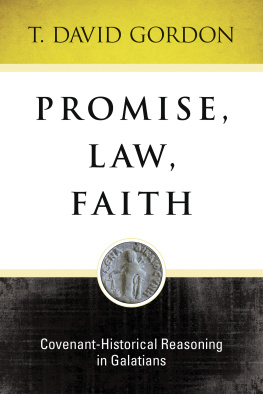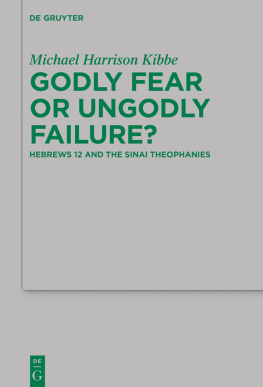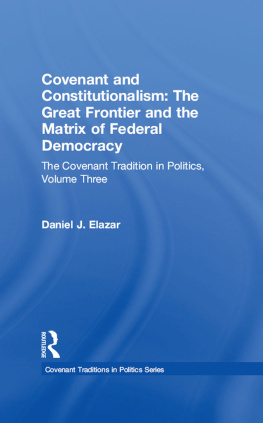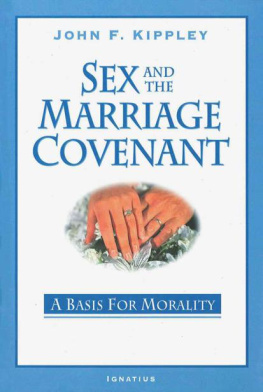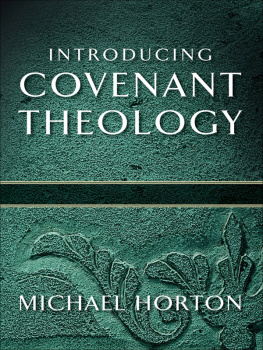Contents
Promise, Law, Faith: Covenant-Historical Reasoning in Galatians (ebook edition)
2019 T. David Gordon
Hendrickson Publishers Marketing, LLC
P. O. Box 3473
Peabody, Massachusetts 01961-3473
www.hendrickson.com
ebook ISBN 978-1-68307-302-4
All rights reserved. No part of this book may be reproduced or transmitted in any form or by any means, electronic or mechanical, including photocopying, recording, or by any information storage and retrieval system, without permission in writing from the publisher.
All Scripture quotations, unless otherwise indicated, are taken from the Holy Bible, English Standard Version (ESV), copyright 2001 by Crossway, a publishing ministry of Good News Publishers. Used by permission. All rights reserved.
Due to technical issues, this eBook may not contain all of the images or diagrams in the original print edition of the work. In addition, adapting the print edition to the eBook format may require some other layout and feature changes to be made.
First eBook edition November 2019
This volume is dedicated to the memory of my doctoral advisor, Paul J. Achtemeier, whose thorough scholarship, judicious reasoning, collegial nature, love for family, and personal encouragements I will never forget.
I have protracted my work till most of those whom I wished to please have sunk into the grave, and success and miscarriage are empty sounds: I therefore dismiss it with frigid tranquility, having little to fear or hope from censure or from praise.
Samuel Johnson, Preface to his Dictionary
Acknowledgments
Many years ago, my doctoral advisor (Paul J. Achtemeier) suggested that someone study the relation of law and covenant in Pauls thought. While I did not pursue that avenue during my doctoral studies (pursuing instead the closely related matter of Pauls understanding of the law), the thought was well planted, and I have been intrigued with the question for three decades now. In addition to Professor Achtemeiers influence, I must mention my former colleague at Gordon-Conwell Theological Seminary, the late Meredith G. Kline. Professor Klines study of ancient Near Eastern covenant treaties, and the bearing of such on biblical studies, has stimulated the thinking of all who have known his work. He also has stimulated my interest in the relation of law and covenant, whether in the Bible generally or in Pauls letters specifically. Whether Professors Achtemeier or Kline would be satisfied or instructed with the results of my pursuing this line of questioning, I may never know; but I do know that I am grateful to them both for stimulating the pursuit.
I should also herein acknowledge my appreciation to those students at Gordon-Conwell Theological Seminary, Westminster Theological Seminary, Covenant Theological Seminary, and Grove City College who have studied Galatians and/or Paul with me since 1984. They dutifully fulfilled their assigned tasks in the scheme of things by playing stump the teacher with untiring, if not always equally cogent, zeal. (One student objected to my views on the ground that he couldnt find them represented in the current commentaries. I asked him if he would believe them if I wrote a commentary, and he looked even more puzzled than before.) In the process, they have caused me to modify and more carefully express a number of my thoughts about the book of Galatians. Just as importantly, not one has come even close to shaking my confidence in my fundamental perspective (regarding the problem at Galatia or the nature of Pauls reasoning therein). Considering how motivated they ordinarily are to rebut the cockamamie hypotheses of their professors, their inability to shake my confidence in my position has, in fact, enhanced that confidence.
I would like to express appreciation to the Grove City College Board of Trustees and administration for granting me a sabbatical leave for the fall semester in the academic year of 201213, which enabled me to begin working on this project. I also wish to express my gratitude to Brian Hutchinson and Ethan Magness for a decade of conversations about Galatians, the dominant Protestant perspective on Paul, and the New Perspective on Paul. Those conversations both sharpened my viewpoints and encouraged my efforts. I am extremely grateful to my former colleague at Gordon-Conwell Theological Seminary, Gregory K. Beale, whowhen I asked if he might glance at the opening and concluding chaptersread the entire manuscript carefully and offered numerous suggestions for improvement.
Finally, I wish to acknowledge gratitude to several editors at Hendrickson PublishersPatricia Anders, Tirzah Frank, and Jonathan Klinefor slogging through a fairly technical manuscript that almost blinded them at some moments, and perhaps made them yearn to be blind at others. None of those who have assisted me are responsible for the many imperfections that remain in the manuscript.
Notes
. Cf. my The Problem at Galatia, Interpretation 41 (January 1987): 3243.
Introduction
E. P. Sanders has served the field of Pauline scholarship well in recent decades.
At least in two areas, if I read the literature optimistically, consensus may be developing in the study of Galatians that undergirds much of what I am attempting to accomplish. First is the lexical observation that in Pauls vocabulary ordinarily refers to the Mosaic law, Second is the now-common historical observation that Pauls difficulty with the law is motivated largely, primarily, or even exclusively by the reality that the law segregated Jews from Gentiles.
Exegetical progress sometimes results from new discoveries in archaeology, history, lexicography, text criticism, grammar, or semantics. Just as often, exegetical progress results from a different paradigm, a different way of construing the available data (as argued in Thomas Kuhns The Structure of ScientificRevolutions). If exegetical progress is made from my labor, it will not be due to my discovering much new about grammar, lexicography, the transmission of the New Testament text, or any other technical matter. Rather, it will be due to my raising slightly different questions than have been raised in the past. The paradigm from which Paul (indeed, the Bible) was interpreted for many years was largely dominated by systematic theological considerations of an ordo salutis nature. In the twentieth century, Pauls students profited greatly by complementing such studies with biblical-theological or redemptive-historical considerations of a historiasalutis nature (Geerhardus Vos, Herman N. Ridderbos, Werner Georg Kmmel, Ernst Ksemann, et al.). Closely related to the latter, though different from it in precise detail, is what I will endeavor to encourage here: a consideration of those matters that might be called historia testamentorum, the history of Gods various covenanting acts. This work attempts to understand Galatians as Geerhardus Vos recommended for understanding the entire Bible:
The Bible is, as it were, conscious of its own organism; it feels, what we cannot always say of ourselves, its own anatomy. The principle of successive Berith-makings (Covenant-makings), as marking the introduction of new periods, plays a large role in this, and should be carefully heeded.
The difference between salvation-historical/redemptive-historical categories and covenant-historical categories is this: The former (salvation/historical) narrates those particular events or deeds that are judged to be significant in the overall work of redemption, overcoming what is lost in the first Adam and restored in the last. But the latter (covenant-historical) narrates the successive covenant-administrations by which God binds himself to his people (and vice versa). Thus the Exodus is a significant salvation-historical event, but it introduces, by itself, no covenantal change. Not until the event at Mount Sinai is a covenant instituted that relates Yahweh to those he delivered from Egypt in a particular way. Similarly, the incarnation is a monumental act in salvation historyso much so, that Eastern and Western Christendom sometimes debate whether it is equal in prominence with the Passion. But the incarnation, significant enough as it is in redemptive-historical terms, does not, by itself, inaugurate any change in covenant-administration. The incarnate Christ was born under the Law, under the Sinai covenant-administration, and he lived out his earthly existence submissive to its stipulations, teaching his followers to do the same (Matt. 5:1721; 23:13). But later, a new covenant was inaugurated in his sacrificial death: This cup is the new covenant in my blood (1 Cor. 11:25; cf. Luke 22:20). Each successive covenant-administration institutes some new practices (some sacramental) and stipulations. Abrahams descendants were not expressly required to offer animal sacrifices until the Sinai covenant was administered; after that, they were. Similarly (and importantly, in Galatians), his descendants were not required to be ritually or dietarily separate from the Gentiles until the Sinai covenant was administered; after that, they were.

